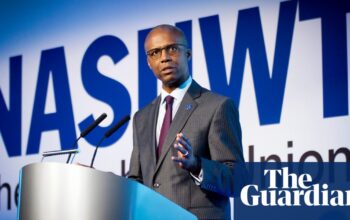
Asked if the public had been misled, the PM’s press secretary said:
No. So we stand by our commitments in the manifesto, which was fully funded.
We were honest with the British public, both during the election and since, about the scale of the challenge that we would receive.
Then, of course, one of the first things the chancellor did when we came in was do an audit of the books and found a £22bn black hole that the previous government lied about and covered up.
So that’s why we have continued to be honest with the British people that there are going to be difficult decisions in this budget, and that’s because of the mess that the Conservatives left the economy in.
to overhaul the environmental regulators and ensure they are delivering growth.
However, environmental experts argue that regulators should put the health of the natural environment first and that it is a perverse incentive to tell the environment department to prioritise economics.
But Labour has been in favour of a growth duty for some time. Labour MPs voted with the then-Tory government last year to enshrine an economic growth duty in the rules of the regulator Ofwat because they did not want to be accused of being anti-growth.
Greenpeace UK’s director of policy Dr Doug Parr said:
Our natural world supplies incalculable benefits for our health, not to mention the food we eat and vital services such as carbon sequestration and flood management. All of these things bring economic benefits that rarely appear in the spreadsheets of economists in Whitehall and the private sector.
That’s why it’s concerning to see regulations being put in a separate column to ‘economic growth’. Regulations are a last defence for our few remaining wild places, countless species, our seas and waterways, and all of the value they provide to society. Of course Defra is a ‘key economic growth department’ by virtue of its fundamental role as custodian of the riches of the natural world.
If Dan Corry’s role is genuinely to make regulations more efficient, we wish him luck. But the mood music sounds concerningly like the ‘bonfire of red tape’ so often touted by the last government.
In a speech on Monday, Keir Starmer said that he would judge regulations by whether or not they were promoting growth, and that he wanted to “rip out the bureaucracy that blocks investment”.
latest MPs’ register of interests has revealed. PA Media says:
Badenoch received more than £130,000 in donations so far this month, including £25,000 from financier Wol Kolade and £20,000 from businessman Charles Keymer, who has now donated a total of £60,000 to her campaign.
Jenrick declared just two donations in today’s update to the register of interests, amounting to £55,000 in total.
These were one £30,000 donation from businessman and former Spectator owner Sir Henry Keswick and a £25,000 donation from Access Industries (UK) Ltd, a company owned by billionaire Sir Len Blavatnik.
the latest update to the register of members’ interests. They show how much he earns from the media.
Farage is a presenter for GB News and he has declared £60,389, received at the end of September, for about 20 hours work.
He has also declared four other payments: £164 from X, which pays some people who post on the site and generate ad revenue; £786 from Meta, which owns Instagram, another site that pays content creators; £12,248 from Cameo, which allows people to buy personalised messages from celebrities; and £3,044 from Google, which owns YouTube.
here, and the updates are here.
I will post some highlights shortly.
in a story for Bloomberg. They say:
Multiple members of the premier’s cabinet have sent formal letters to the premier about cuts they’re being asked to make in the one-year departmental spending review to be announced alongside the budget, according to the people, who requested anonymity discussing behind-the-scenes communications. They spoke about the letters on the condition the departments involved weren’t identified.
The unease at the top level of government highlights the political tightrope that chancellor of the exchequer Rachel Reeves is treading as she seeks to restore order to Britain’s public finances through a combination of taxes and spending cuts totaling £40bn ($52bn).
Downing Street told Bloomberg this was a routine part of the budget process.
the BBC, there will be a private funeral for Salmond, followed by a public memorial service later.Sky News, Israel’s national security minister, Itamar Ben-Gvir, has dismissed the news that the UK government has considered imposing sanctions on him over his support for settlers in the West Bank attacking Palestinians. (See 12.21pm.) Ben-Gvir told Israeli media:
Just as before the establishment of the Jewish state the British worked to make it impossible, now they continue to do so after its establishment in the midst of an existential war …
They do not scare me, and I will continue to act in accordance with the supreme national interests of the state of Israel only and for the people of the country.
could not be trusted, Rosie Anfilogoff reports. She goes on:
The government has now published the full report from the Dash review into the CQC, the independent regulator of health and social care in England which is meant to ensure organisations like hospitals and care homes are safe and effective.
The full report depicts a CQC that functions poorly, leaving patients without the ability to make informed choices on their care, and providers without proper oversight.
In recent years there has been a stark reduction in activity, with the number of inspections and assessments undertaken in 2023 and 2024 almost half what they were in 2018 and 2019.
According to CQC data given to the review, the average age of ratings is 3.9 years old, but there is at least one hospital that was last rated over 10 years ago.
And, the report finds, the CQC has never even rated 19% of locations under its purview. For institutions found to require improvement, the delay for a re-inspection has increased to almost a year when previously it was 152 days, leaving providers stuck in limbo.
The government has welcomed the seven recommendations set out in the report, and Sir Julian Hartley will shortly begin as the CQC’s new chief executive.
an article in the Daily Mail, published before the private member’s terminally ill adults (end of life) bill was formally presented to the Commons today. Matthew Weaver has the story.
Taylor Swift concerts in London.
Keir Starmer has been dogged by questions about the concerts, and the decision to give Swift a police escort to them, for days, with some newspapers suggesting there was an improper link between Swift getting a police escort, which is unusual for celebrities, and Starmer being offered free tickets for her concerts.
Starmer has repaid the value of the tickets, and No 10 insists that the decision to provide an escort was a matter for the Metropolitan police. Yesterday No 10 rejected the claim the tickets had been a thank you gift for Starmer after the police escort was provided.
Today the PM’s spokesperson insisted – more strongly than it has done in the past – that the security issues raised by the tour meant it was appropriate for the government to be involved in talks with the Met about what should happen. The spokesperson said:
It is entirely right, and I think the public will expect the government, the police, the mayor of London to be involved in discussions and planning of events to ensure that they run smoothly, that the public is kept safe and that the government is sufficiently reassured – and in this case, in the context of recent terrorist plots overseas – that that public safety is maintained at all times …
You should expect the government to have conversations with the police on events of this magnitude and scale … and for that to be entirely consistent with the Met being operationally independent.
The spokesperson also said Starmer would not be referring himself to the independent adviser on ministerial standards on this issue.
9.22am) meant Labour misled voters about its tax plans at the election. During the campaign, Labour set out plans to raise taxes by £7.3bn.
Asked if the public had been misled, the PM’s press secretary said:
No. So we stand by our commitments in the manifesto, which was fully funded.
We were honest with the British public, both during the election and since, about the scale of the challenge that we would receive.
Then, of course, one of the first things the chancellor did when we came in was do an audit of the books and found a £22bn black hole that the previous government lied about and covered up.
So that’s why we have continued to be honest with the British people that there are going to be difficult decisions in this budget, and that’s because of the mess that the Conservatives left the economy in.
12.05pm], issues surrounding Send, local government finance and adult social care are issues which affect all of our constituents.
And let’s be honest, for too long both parties have ducked and dodged taking the difficult but necessary decisions.
In order to give certainty to our constituents and confidence to those who provide those vital services, does the prime minister share my assessment that there is considerable merit in formal cross-party working on these issues where we can share taking those difficult decisions in order to improve outcomes for our constituents?
Starmer replied:
I am grateful to him for raising this question about Send, because it is a really important issue and I think this is the fourth time in two PMQs where it has been raised on both sides of the house.
I quibble with his suggestion it’s both parties, since his party was in power for 14 years.
But the spirit in which he puts this forward, that this should be cross-party, is something that we should take up, because it’s such an important issue and it affects so many children and parents and therefore, notwithstanding the quibble, I am very happy to work across the house on an issue as important as this.
PMQs and, when they do, it is normally a) because a global crisis is dominating the news to such an extent that they can’t ignore it, and b) a sign that party politics is going to take a back seat, because often there is cross-party consensus on global issues.
Today Rishi Sunak chose to devote all his six questions to China, and related national security issues, and it was not entirely clear why. David Lammy is due to visit China, Chinese tensions with Taiwan are on the rise, but it was not a topic that anyone will have felt Sunak had to raise. It is an issue on which the Conservative party is more or less united, but the same applies to putting up taxes (like China, another thing Tories don’t approve of), and Sunak could easily have devoted his questions to budget issues again.
Perhaps Sunak really does believe the line that his party peddled during the election campaign about Starmer being soft on national security? But if he was trying to show that today, he failed badly. To his first three questions, all demanding a tough stance against China on various issues, Starmer was more than happy to agree.
Sunak then tried more critical questions, suggesting that Starmer was being soft on national security because the government has not yet used the foreign influence registration scheme to impose constraints on Chinese lobbying (something that Sunak’s own government was dragging its feet over more than a year ago) and because the government has shelved the Freedom of Speech Act for universities (a measure that the Tories always presented as an anti-woke law, not an anti-China law, when they actually passed it). On both these points, the Sunak critique flopped. On the first point, Starmer just told Sunak he was wrong, and on the second he ignored it witheringly, and criticised the Tory leader for being partisan. Sunak sounded half-hearted, or badly informed. If he really felt these were important points, he should have pursued them.
A good rule in the Commons it to reply to a question in the manner in which it is asked – constructively if it constructive, and aggressively if it is aggressive. Starmer did ramp up the party politics a bit in his final answers, but Labour MPs may have liked it if he had done that even more.
Keir Starmer and Rishi Sunak. You may need to refresh the page to get the updates to appear.PMQs.Cornwall, and the case for giving it an assembly.
Starmer says he does believe in devolving power to local authorities. He wants deeper and wider devolution to local government.
UPDATE: Maguire said:
Will the prime minister meet with all six Cornish MPs to discuss devolution for Cornwall, with a Cornish assembly which recognises our unique culture, language and national minority status, so we can finally unleash Cornwall’s economic potential?
And Starmer replied:
I do believe in transferring power out of Westminster and into the hands of leaders who know their communities best, those with skin in the game know what’s best for their communities.
We are already making steps in the south-west by signing the devolution agreement for Devon and Torbay, I actually encourage local authorities to work with their neighbours to pursue deeper and wider devolution for their area.
Kit Malthouse (Con) says during the election Starmer made an unequivocal promise to rebuild Basingstoke hospital. Does that promise still apply?
Starmer says the government is reviewing the programme of the last government. But it is flawed, he says. There were not 40 hospitals, they were not all new, and they were not all funded. He says it is important that voters know who is to blame if what the last government promised does not happen.
Shaun Davies (Lab) asks what the government is doing to reduce suicide rates amongst men.
Starmer says the figures for male suicide are “truly shocking”. He recalls going to an event where men were asked if they knew someone who had died from suicide, and he says he reflected on his own experience (implying this has happened to someone he knows).
Source: theguardian.com



